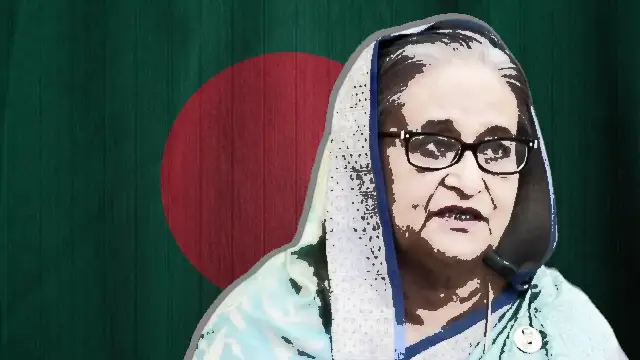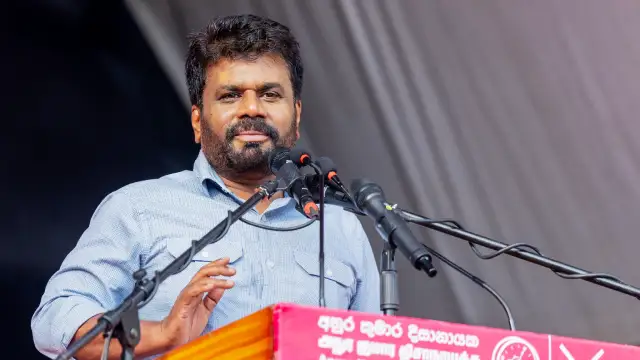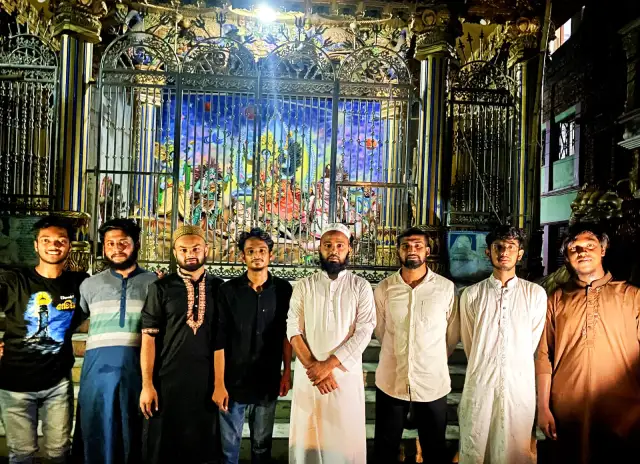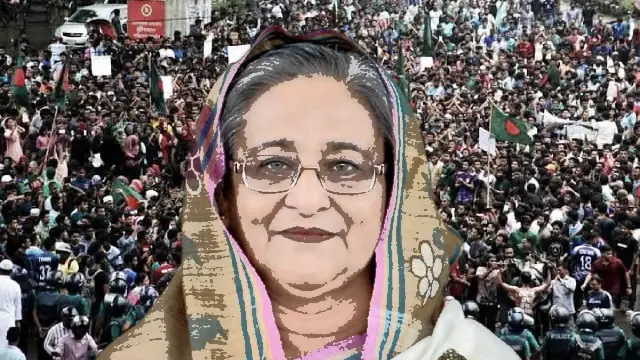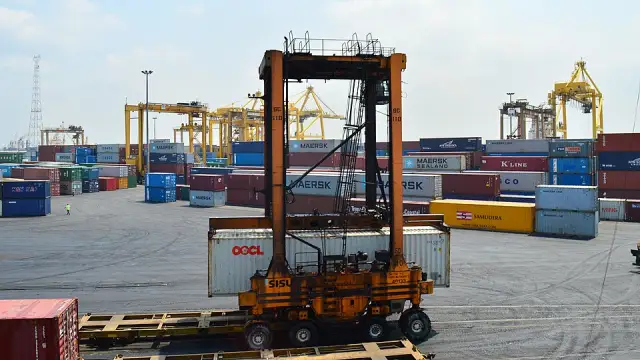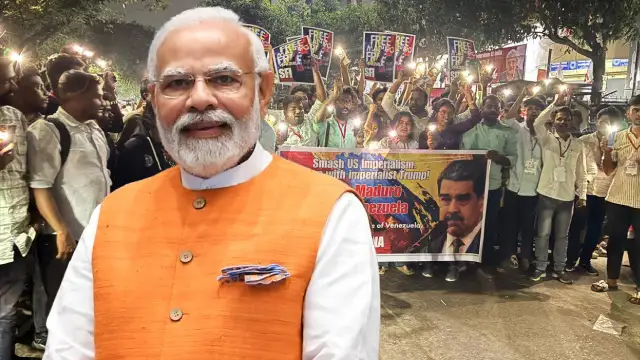After remaining silent for over 15 months, Sheikh Hasina, Bangladesh’s deposed prime minister, accused of crimes against humanity in her country, has resurfaced on the mainstream media landscape with her controversial “email interviews”. In these interviews, facilitated by her outlaw organisation, the Bangladesh Awami League (BAL), the former prime minister has been attempting to present herself as an Eminence Grise in the South Asian country.
In the current geopolitical scenario, Ms Hasina’s “email interviews” have become significant as Muhammad Yunus’s government has decided to hold a simultaneous referendum on the July Charter, drafted following the August 2024 uprisings, alongside the national general elections in February 2026.
In her interviews with Western, Indian and Russian propaganda machineries, Ms Hasina has emphasised her desire for rapprochement with the US-led collective West and her hope that India will help restore her ousted government.
This has especially put Russia’s RT in a soup, as the interview contradicts its narratives. However, Ms Hasina’s “email interviews” have reaffirmed the allegations raised by her opponents in Bangladesh — that she works as a vassal of India.
Hasina’s ‘email interviews’ trouble Russian narratives
Since Ms Hasina’s downfall, while the Russian administration has carefully navigated the complex water and tried to find mutually beneficial grounds to work alongside the interim government in Dhaka, its state-sponsored propaganda outlet RT has joined the bandwagon with India’s federally ruling far-right Bharatiya Janata Party (BJP) to label the July-August 2024 uprisings as a “colour revolution” funded by the CIA.
Mr Yunus’s close association with the Democrats, the US-based neo-liberal “regime-change” lobby’s support for the Bangladesh uprisings, have been shown as evidence to downplay the organic factors that led to the BAL leader’s ouster.
While the BJP has been levelling these allegations since Ms Hasina’s fall, coupled with its “Hindu persecution” bogey in Bangladesh, Indian Prime Minister Narendra Modi had enhanced India-US ties with the erstwhile Joe Biden administration during his state visit in June 2023. The BJP and the RT have carefully decoupled India-US ties with their allegations of the US sponsoring a colour revolution in Bangladesh to keep India under check, which ironically had benefited the most under the Democrats in South Asia.
However, much to the Russian media’s dismay, Ms Hasina denied the American role behind the uprisings during her email interview with the RT, causing major embarrassment for the Russian state-sponsored media outlet.
“I do not believe the US government was involved. I have had good relationships with successive presidents and am a particular admirer of President Trump,” the fugitive leader hiding in India told the RT.
The RT also admitted that the former Bangladeshi prime minister has admitted in her interview that though the interim government’s head has many admirers in the West, he is not a “front man” of the US.
Ms Hasina’s clean chit to the US has pushed both India and the Russian state-sponsored media, which peddles the BJP’s Hindutva-incensed propaganda in the South Asian perspective, to an embarrassing corner.
It appears that Ms Hasina, whose loan requests were rejected by China during the fag end of her tenure, has been trying to woo Donald Trump, who had a personal feud with Mr Yunus earlier but exempted Bangladesh from a higher tariff regime vis-à-vis India, even though he shared a bonhomie with Mr Modi due to their shared Islamophobic vision.
The reason for Ms Hasina to seek help from Mr Trump lies in the fact that it’s her government that had kept the Chinese investments and involvement in the Bangladeshi economy under check and used Beijing’s funds to help build infrastructure, to help India, like the Padma Setu.
The Russians, who need India as a countermeasure against China’s growing clout and to tackle Beijing after it surpasses the US in the future, have found this problematic.
Throughout the interview, Ms Hasina has downplayed the US’s role and even declined to disclose American interests in St Martin’s Island, which is a crucial strategic location for naval domination and surveillance on the Bay of Bengal.
Hasina goes into denial mode
In contrast to the RT interview, where she denied the US’s role behind deposing her, Ms Hasina, in one of her “email interviews” with the BBC, denied any wrongdoings not only during the July-August 2024 uprisings, where, critics and investigations allege her government has killed over a thousand protesters, mostly youths from marginalised backgrounds, but also during her 15-year-long rule.
Ms Hasina’s “email interviews” have surfaced at a time when the International Crimes Tribunal (ICT-BD) is going to announce its verdict in the case against her, former home minister Asaduzzaman Khan Kamal and then inspector general of police (IGP) Chowdhury Abdullah Al-Mamun. While Ms Hasina and Mr Kamal have been absconding and have been declared fugitives, Mr Mamun has become a state approver.
Fearing the repercussions of the ICT-BD judgement, which can close doors of the West to her, Ms Hasina has been trying to play the victim card using her “email interviews”.
She has categorically denied any wrongdoing during the monsoon uprisings. According to Ms Hasina’s email correspondence with the BBC, she has claimed that she didn’t order the use of lethal force to suppress the youth movement. While she claims that the ICT-BD is a kangaroo court, she has expressed her apprehensions regarding being found guilty.
Reliance on India
In Ms Hasina’s “email interviews”, the former prime minister has been hailing India’s role in Bangladesh. This confirms her opponents’ allegations that she had turned her government into a vassal of India during the BAL’s 15-year-long tenure.
She slammed Mr Yunus’s government for asserting its sovereignty and questioning India’s role in Bangladeshi politics. Critics allege that while Ms Hasina has been historically allied with India, she has to further seek New Delhi’s favour in the present circumstances, as India isn’t only hosting her, but also a large number of fugitive BAL activists and leaders have taken shelter in the state of West Bengal.
A BBC investigation has revealed that several BAL activists and leaders are operating out of West Bengal, allegedly with the tacit endorsement of India’s Ministry of Home Affairs.
Even though the far-right BJP government has raised a bogey against so-called “Bangladeshi infiltration” and is persecuting Bengalis of Indian origin.
The BJP has been highly supportive of Ms Hasina and has largely ignored the fact that several fugitive BAL activists and leaders have sneaked into India and are running political campaigns in the neighbouring country from indian soil. This has the potential of further deteriorating India-Bangladesh ties.
Mr Yunus’s government has been demanding the extradition of Ms Hasina from India, which the latter has been denying.
On the one hand, in her desperate bid to appease India to thwart any attempt to extradite her, Ms Hasina continues to hail Mr Modi’s government; on the other hand, India continues to harbour her, hoping to restore her rule, capitalising on the chaos that may follow if the 2026 general elections fail to provide a stable government.
While losing Ms Hasina’s government has been a major loss for India, its continuous support for her and the BAL, overlooking the major discontent at the grassroots against the duo, has become a major foreign policy debacle for New Delhi at a time when it’s losing clout in the region due to its hegemonist attitude under Mr Modi’s far-right government.
China factor
As Ms Hasina’s government didn’t balance its relationships with China well, since her fall, Beijing has been enhancing ties with Mr Yunus, as well as the Communist Party of China is renewing its party-to-party ties with all major political parties in Bangladesh, from the far-right Jamat-e-Islami to the left-wing Communist Party of Bangladesh.
Although enhancing ties with the Trump administration is mandatory for whoever wins the 2026 general elections, it’s a fact that Dhaka won’t be able to ignore China any more and can’t even shape relations with Beijing according to the whims of New Delhi, which Ms Hasina had been doing.
In this scenario, as India continues to ignore the other major political parties in Bangladesh, refrains from improving ties with the interim government, and the military establishment, it stands to cede more diplomatic grounds to China, which enjoys leverage.
Ms Hasina’s “email interviews” exhibit her frustration with the status quo, and she realises it may take India longer than she expects to bring back the BAL into the political mainstream of Bangladesh. Thus, she continues to bat for the US, expecting support from Washington. However, her prospects appear bleak at the moment.
Join our channels on Telegram and WhatsApp to receive geopolitical updates, videos and more.

